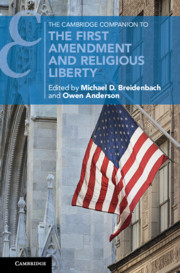Book contents
- The Cambridge Companion to the First Amendment and Religious Liberty
- Cambridge Companions to Law
- The Cambridge Companion to the First Amendment and Religious Liberty
- Copyright page
- Dedication
- Contents
- Notes on Contributors
- Acknowledgments
- Introduction
- Part I Philosophical Foundations
- Part II Historical Interpretations
- Part III Law, Politics, and Economics
- 9 Religious and Secular Presuppositions in First Amendment Interpretations
- 10 Two Concepts of Religious Liberty
- 11 The Economic Origins of Religious Liberty
- 12 Corporate Religious Liberty and the Culture Wars
- 13 Which Original Meaning of the Establishment Clause Is the Right One?
- 14 The Two Separations
- 15 The Challenge Ahead
- Index
15 - The Challenge Ahead
Reconnecting Religion, Reason, and Truth
from Part III - Law, Politics, and Economics
Published online by Cambridge University Press: 17 December 2019
- The Cambridge Companion to the First Amendment and Religious Liberty
- Cambridge Companions to Law
- The Cambridge Companion to the First Amendment and Religious Liberty
- Copyright page
- Dedication
- Contents
- Notes on Contributors
- Acknowledgments
- Introduction
- Part I Philosophical Foundations
- Part II Historical Interpretations
- Part III Law, Politics, and Economics
- 9 Religious and Secular Presuppositions in First Amendment Interpretations
- 10 Two Concepts of Religious Liberty
- 11 The Economic Origins of Religious Liberty
- 12 Corporate Religious Liberty and the Culture Wars
- 13 Which Original Meaning of the Establishment Clause Is the Right One?
- 14 The Two Separations
- 15 The Challenge Ahead
- Index
Summary
The meaning and value of religious liberty in the United States is changing dramatically, under the weight of both short-term legal pressures and long-term cultural shifts. Over the last few years, a sharply escalating solicitude for “sexual minorities” has confronted and diminished religious liberty in the law for the millions of Americans who adhere to traditional views about the nature of marriage and the morality of sexual activity. Over the last several decades, Americans have come to understand their own religious convictions through the mediating lenses of subjective experience and individual spirituality, so much so that “religion” has come to be an aspect of personal “identity.” Now it seems that “religious liberty” is one subset among many of an encompassing right of self-definition, which also includes sexual identity. And where these two sides of the “identity” coin come into conflict, “religious liberty” is more often than not the loser. This development is potentially momentous, for what was long described as Americans’ “first freedom” has, in fact, been an axiom of the political culture and a strategic linchpin of the whole of constitutional civil liberties.
Keywords
- Type
- Chapter
- Information
- Publisher: Cambridge University PressPrint publication year: 2020
- 1
- Cited by

